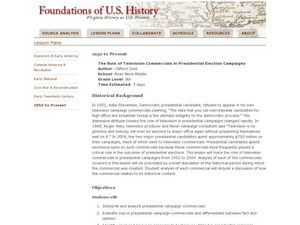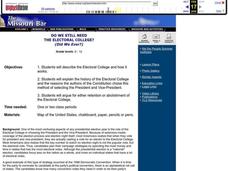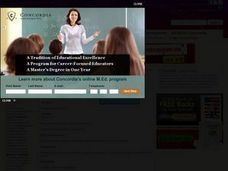Curated OER
Election Day
In this election day worksheet, students watch TV reports on election day and record the electoral votes at a given time. Students then predict who the winner will be.
Curated OER
"The Election"
Students participate in an election for the purpose of comprehending the political process and the responsibilities that come with citizenship in a free society. They elect officials with no identity and are surprised with the revealing...
Curated OER
Elections in America
Eleventh graders examine the election process in America. In this US Government lesson, 11th graders analyze the problems with the Electoral College. Students research a specific state and create a state flash card in regards to the...
Curated OER
The U.S. Election Process
In this election process worksheet, pupils answer five multiple choice and two short answer questions about the U.S. election process. They are directed to use "Ben's Guide to the U.S. Government for Kids" on the internet for their answers.
Curated OER
Election Time Line
In this reading a time line about the election of the president worksheet, students read about the campaign, inauguration, primaries, national conventions and election day and put them in chronological order. Students rearrange 5 events.
Curated OER
The Role of Television Commercials in Presidential Election Campaigns
Eighth graders investigate the evolution of the presidential election campaign. In this media awareness lesson, 8th graders examine the use of television commercials during campaigns and their impact as they complete worksheets based on...
Curated OER
Do We Still Need the Electoral College?
One of the most confusing aspects of any presidential election year is the role of the Electoral College. Learners read a bit about how the Electoral College works and then they hold a mock election in their classroom. They'll redraw a...
Curated OER
Voter Fraud: Are Ghosts Going To The Polls
Students research background material about voting in their community. They interview local/county election officials to see what is going on in the community. They also interview teachers, and students to determine if they are newly...
Curated OER
Your Vote Counts!
Students build an election campaign around their favorite TV characters. They acquire knowledge about candidates, slogans, qualifications, and voting using the activities in this instructional activity. Thus, they simulate the election...
iCivics
Mini-Lesson: The Incumbent Advantage
Does the person running for re-election have an advantage over the challenger? Scholars explore the concept of incumbent advantage during elections using an informative mini-lesson explaining the legislative branch. In pairs, they...
City University of New York
Electoral College
A presidential election is a lot like the 2004 World Series, and it's also a lot like choosing an orange in a paper bag. Apply the process of the electoral college to these two analogies with a set of lessons about government...
Caucus 101
Linkage Institutions: Interest Groups: Option A
How are elections really run and won? Learn about special interest groups, super PACs, and lobbyists with an engaging activity about the caucus process. Young voters research specific interest groups and analyze their part in previous...
Carolina K-12
Propaganda, Spin and Soundbite Politics
It's all about the spin! In an introduction to propaganda techniques and soundbite politics, scholars first learn about common propaganda techniques before seeing them in action in the context of the 2016 election cycle. Activities...
Carolina K-12
The Electoral College
Put the Electoral College into perspective with a simulation of an election. Scholars experience an electoral vote, participate in an in-depth discussion on the topic, and engage in a congressional committee where they learn about the...
Encyclopedia Britannica
Beyond a Two-Party System
Young political scientists go beyond the two-party system and research third-party candidates running in the 2020 US Presidential election. Groups present background information about the candidate, the party's platform points, and a...
Constitutional Rights Foundation
270 Votes to Win: The Electoral College in the United States
What exactly is the Electoral College and how does it work? The instructional activity is part of a larger series on government that explains what the Electoral College is and how it helps determine an election winner. Academics...
C-SPAN
Presidential Candidate Firsts
Hilary Clinton may have been the first woman to run for president on a major party ticket, but she was only one example of an historic candidacy. Class members use video clips curated from C-SPAN to examine historical firsts in...
C-SPAN
Electoral College Pros/Cons and Alternatives
If every vote counts, why do we need the electoral college? Middle and high schoolers study the Constitutional precedent of the electoral college, as well as its place in historical and modern elections, with an engaging social studies...
Encyclopedia Britannica
Presidential Qualifications
Can anyone grow up to be president of the United States? As part of their study of the 2020 election, groups research the constitutional requirements to become president. The class then brainstorms a list of qualifications beyond those...
NYC Department of Records
Citizenship and Elections: The Importance of a Ballot
Approximately 58 prcent of those eligible voted in the 2016 US Presidential election. In an attempt to impress upon learners the importance of voting and voting rights, class members examine primary source documents related to the...
Curated OER
How the Media Uses Polling Data in Presidential Election Coverage
Students research and analyze polling data in journalism. They discuss reasons that polling data is included in media coverage of presidential elections.
Curated OER
Election Poll, Variation 2
When a random sample isn't enough, your math class can compare the data from a physical simulation to decide if the probability is still likely. The lesson is part of a probability series that focuses on one question and different ways...
Curated OER
Election Poll, Variation 3
Build on probability and incorporate a random number generator to select outcomes for a school election. Your learners will record their results on a dot plot and answer questions regarding whether their candidate has a chance at the...
C-SPAN
Why Do Americans Not Vote in Elections?
In an age of inflamed politics, who votes, who doesn't vote, and why are the questions everyone is trying to answer. Pupils listen to scholars, journalists and data crunchers on voting statistics to make their own conclusions. A chart...
Other popular searches
- Election Day
- Presidential Elections
- Election Day for Kids
- 2008 Presidential Election
- Voting and Elections
- Election of 1860
- Election 2008
- 2nd Grade Election Day
- Mock Election
- Election Day Activities K 3
- Abraham Lincoln Election
- 2008 Elections

























